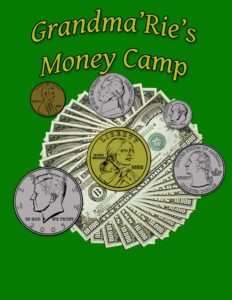Teach Your Kids About Money
Grandma’s Money Camp -Teaching my grandchildren personal finance.

Grandma Rie’s Money Camp
I’m building my bridge to the next generation and helping my kids teach their kids personal finance by holding an annual Grandma Rie’s Money Camp for my two grandchildren.
This is the second year we have had this camp. Last year they were 3 and almost 7 and I went to their house. We held camp for half a day and covered basic concepts such as learning what money is used for, identifying coins and currency and starting to learn that 4 quarters = a dollar and etc. We also started learning what people do to earn money, talking about jobs and having a business. Read all about last years camp in detail!
This year, they are almost 5 and just 8 and we are combining money camp with a week long trip to Tablerock Lake. Parents won’t be around this year but we will be supported by aunts, cousins and other family members. We will have camp most of the day with liberal breaks for swimming, hugs, games and Branson activities.
We will again cover some basic economic concepts and terms, but will also introduce several new ones – including interest, compound interest, investing and the psychology of money values.
Whatever your child’s ages, you can begin to teach sound personal finance knowledge and behavior.
You can teach economic terms.
This year we are focused on: currency, price, income, bank, deposit, withdrawal, interest, incentive, consumer, producer, employment, specialization, division of labor, budget. These are the terms that the Federal Reserve (fifty nifty) recommends that 3rd graders should know. My oldest will start third grade the week after camp ends.
Last year we combined recommendations and covered all of these below terms in various activities:
Kindergarten – Wants, Needs, Scarcity, Choice, Goods, Services.
First Grade – Resources, Barter, Money, Earn, Spend, Save.
Second Grade – Opportunity Cost, Natural Resources,Human Resources, Capital Resources, Currency, Price, Income.
We will continue to review the above – especially needs vs. wants. The little one will need to learn them and the older one will get a good repetition.
You can teach entrepreneurship.
Once again this year, my grandchildren will chose one of several kid businesses to start and hold for a couple of hours one of the days. They will learn about income and expenses, needed supplies, marketing, sales and advertising, budgeting, making decisions, counting money, giving change, profit and loss and a myriad of other things from having their little soft drink stand or an ice cream shop or some other business of their choice.
To prepare for their business, we will have a pretend play business a day or two before hand. They will practice their selling techniques and have a good time (if last year was a good indication).
You can teach money values.
With their parents permission, we will start to learn about the psychology of money this year. We will hunt for buried treasure (using a metal detector) and talk about the hard fact that easy money isn’t easy. We will watch Richie Rich and figure out that having a lot of money isn’t the very most important thing in the world. We will make a gift for Mom and Dad and learn how good it makes us feel to give someone something.
We will read The Little Red Hen and If you give a pig a pancake If You Give a Pig a Pancake Big Book to learn that we need to work for what we get and not enable others to feel entitled to get what they want without working for it.
You can teach that money can grow.
A new focus we will have this year is demonstrating how money can grow if you get interest, especially if you get compound interest. My little 8 year old math whiz should enjoy calculating how it will grow, and my little 5 year old will be amazed at how much a dollar in a glass jar grows if you add half the amount to the money in the jar every day for 7 days!
When we start their business, we will print up some pretend stock certificates and talk about how and why people buy stocks. We’ll check out companies they care about (such as Nintendo – because they make the DS the 8 year old just got).
They will also be advised that money can be collected (and may, infrequently, increase in value as a collectible). A gift of quarter books for them to plug quarters into will help them figure out if this is an activity they might want to pursue. One book for quarters from each state and the other book for quarters from the national parks. As they put my quarters in their books we will talk about other alternative investments that people have, and why they aren’t a sure thing.
You can teach how to spend money wisely.
They will each get a calculator to take to the store so they can add up how much things might cost as we shop. We will look for the best value, including price and quality and talk about needs and wants as we look.



